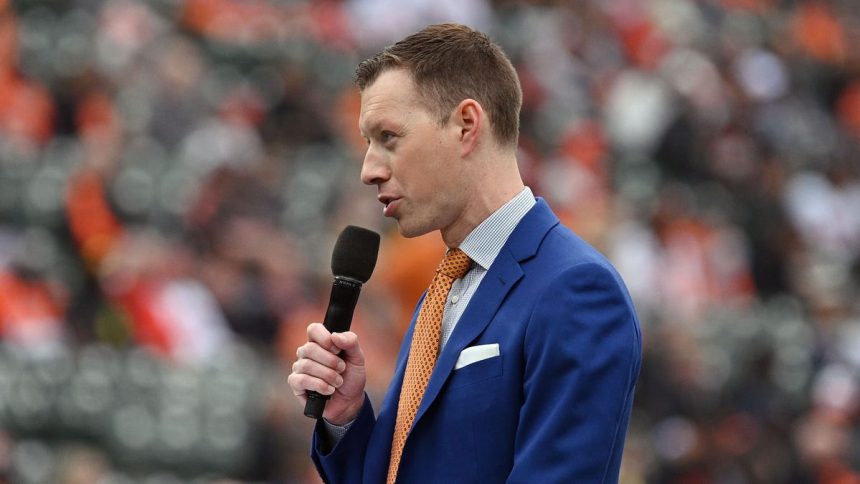The Baltimore Orioles, currently sitting 28 games over .500, have not seen this level of regular-season success since winning the AL pennant in 1979. But now the O’s find themselves in the national spotlight — not because of their plucky 2023 campaign, but rather for an apparently heavy-handed intervention by team owner John Angelos, who — displeased by a bit of radio commentary — reportedly removed the team’s play-by-play man, Kevin Brown, from the booth. Angelos has seemingly relented on this move in the wake of a media firestorm, but the damage has been done.
And, more pressingly, Angelos’ tactics illustrate a far broader issue plaguing sports media: The uncomfortable truth that today’s analysts, commentary teams, and beat writers often find themselves employed by, or otherwise at the mercy of, the very billionaires whose teams they seek to cover objectively.
“Whether it’s government, whether it’s sports, when these institutions are not being scrutinized in the same way, obviously, the cumulative effect is a lack of transparency that the public has,” one employee of a New York cable network that airs pro games told Deadspin. “A sports network owned by the team might cover the trade deadline critically, but I would say would be unlikely to investigate. … All these places that independent journalism digs, the loss of it means that those things aren’t going to be dug into.”
Brown last took part in a radio broadcast on July 26, according to the Baltimore Banner. Brown has been one of the voices in the Orioles’ booth since the beginning of last season, for Mid-Atlantic Sports Network, while Angelos serves as MASN’s President and COO — quite the self-serving interest, and one that is not at all exclusive to the Orioles or even baseball at large. For example, the New York Knicks own MSG Network and therefore can generate more revenue streams and control programming. Many franchise owners (though not all) enjoy a similar sort of vertical integration with the TV and radio products they put out.
“It’s a somewhat-less-serious version of what’s happening with local journalism and state houses all over the country and governments that are being less scrutinized,” the New York broadcast employee told Deadspin. “You know, the local New Jersey paper that discovered Bridgegate, (with) Governor (Chris) Christie, I wonder if Bridgegate would ever have seen the light of day now with so much less local newspaper coverage in New Jersey and at the statehouse in Trenton. That’s just one example. When there are fewer journalists to dig, fewer important stories will come to light. So I just think what’s happening in sports is a symptom of that.
“It’s surprising that it happened to that degree. I’ve certainly never heard of a team network employee being told not to state facts in an even way,” the employee said. “Even for an industry in which the team obviously expects to yield some control over what is said on the air, that was more extreme than I’ve ever seen.”
Dave O’Brien, who calls games for the Orioles’ division-rival Red Sox, called Brown’s situation “a fiasco.” Yankees broadcaster Michael Kay called the move “unconscionable” and said he hoped Angelos would hear from league commissioner Rob Manfred on the grounds of Brown’s suspension. Due to how the Orioles have played a majority of the last three decades, you would believe Angelos would be used to criticism, much less what Brown provided, which was likely a collaboration between himself and producers at the very least. It’s a glaring example of team interference into any kind of negative coverage.
But, again, Angelos is hardly the only owner with this sort of leverage over the broadcast product.
“Certainly, if you go back 20, 30 years, there was not even daily coverage on television, a daily broadcast for most teams. So all of the coverage would have been newspapers. Teams would have had no control over it, at all,” the New York cable employee told Deadspin. “This isn’t to say that newspaper journalism is pure and that people didn’t have unholy relationships with sources, were always objective and things like that. But there was an independence to it. From a business standpoint, it was different from a team-owned network.”
Team ownership being less accustomed to negative coverage has a direct correlation with the decline of print journalism over the last decade. There are fewer people involved, and fewer opportunities for criticism, because there are fewer jobs covering those teams on a full-time basis. The source I spoke with said they couldn’t see a remedy coming for teams relinquishing control or someone investing money into independent journalism. That domino effect could lead to self-censorship in segments like the one that caused a media circus for Brown and the Orioles — and that sort of fear can affect not only the careers of those broadcasters, but harm the on-air product itself.









